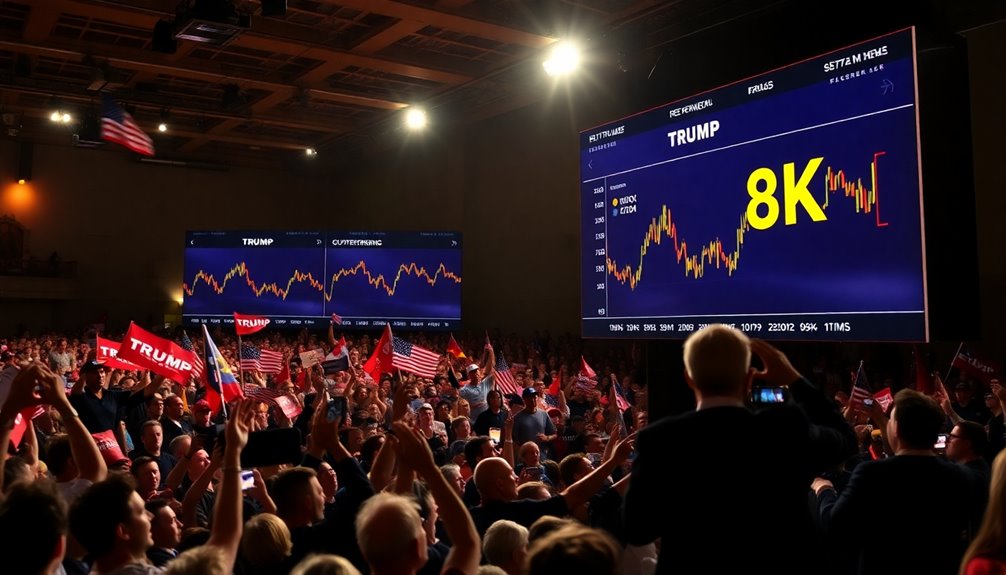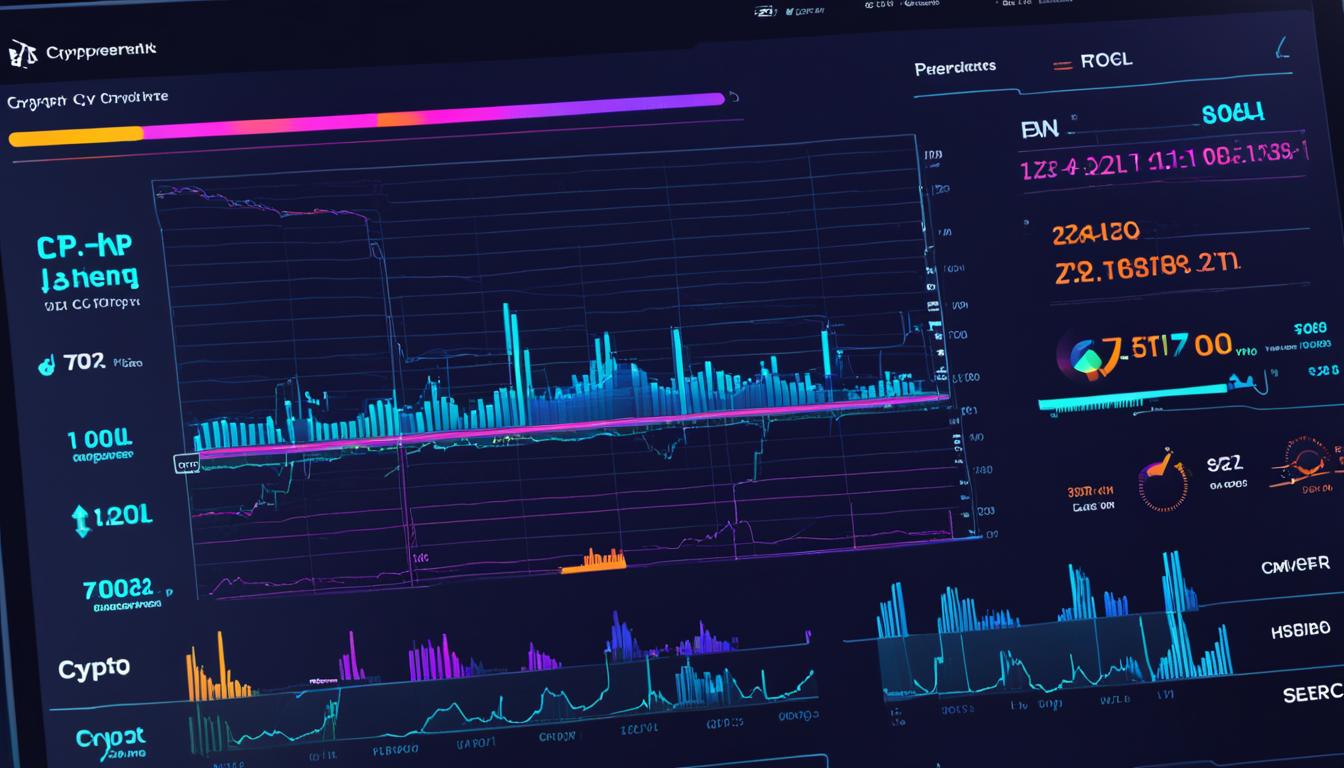Trump's crypto policies could lead Bitcoin to drop to $80K due to heightened regulatory scrutiny and market volatility. He plans to ease burdens on the industry, aiming for the U.S. to become a crypto capital, but that might also attract increased legal challenges. As investor sentiment shifts rapidly, any negative news could amplify fear and uncertainty. Moreover, Trump's proposal for a strategic Bitcoin reserve may have unforeseen implications on market dynamics. If you're curious about how these factors interplay and affect Bitcoin's trajectory, there's more insight waiting for you.
Key Takeaways
- Trump's proposed regulatory changes could create uncertainty, leading to increased selling pressure on Bitcoin and driving its price down to $80K.
- The introduction of a strategic bitcoin reserve may initially stabilize prices but could lead to market oversupply and lower valuations.
- Concerns about retail investors entering the market without understanding risks could trigger panic selling during market corrections.
- Regulatory scrutiny from a pro-crypto SEC may lead to enforcement actions that create volatility and investor hesitation, impacting Bitcoin's price negatively.
- Investor sentiment may shift if tariffs and inflation fears rise due to changes in energy consumption from crypto mining, affecting Bitcoin's attractiveness.
Trump's Influence on Crypto

As Trump promises to make the U.S. "the crypto capital of the planet," his influence on the cryptocurrency landscape is becoming increasingly apparent.
His campaign's strong support from the crypto industry reflects a shared vision for a more favorable regulatory environment. By nominating advocates like Paul Atkins for SEC chair, he aims to ease the regulatory burdens that have stifled growth.
His idea of a U.S. strategic bitcoin reserve could legitimize cryptocurrencies, enhancing their mainstream appeal. This could attract more investors and stabilize prices. Moreover, his proposed government stockpile of Bitcoin could further solidify the U.S.'s commitment to cryptocurrency as a legitimate asset class.
However, while Trump's policies spark optimism, they also raise concerns about retail investors diving in without fully grasping the risks involved.
Ultimately, your engagement with crypto may shift dramatically under his administration's guidance.
Legal Challenges Impacting Markets

Legal challenges are reshaping the cryptocurrency market in significant ways, creating an environment filled with uncertainty for investors.
The decentralized nature of cryptocurrencies complicates legal recourse, as transactions can occur across borders without clear jurisdiction. You face confusion due to varying regulatory frameworks, which impact how cryptocurrencies are classified and taxed. Regulatory scrutiny can lead to investigations or enforcement actions against users, further complicating the landscape for investors.
Tax implications, like capital gains tax, require meticulous reporting, adding further complexity. Market volatility increases as regulatory changes can dramatically affect prices, while the risk of market manipulation looms larger in decentralized exchanges.
Without clear legal guidelines, you're left vulnerable, especially in cases of theft or fraud, underscoring the need for robust legal protections in this rapidly evolving landscape.
Investor Sentiment Shifts

Investor sentiment plays a crucial role in shaping the dynamics of the cryptocurrency market, influencing both short-term price movements and overall market stability.
When sentiment is positive, you'll often see a significant boost in market returns, supported by textual analysis that highlights its predictive power. This positivity can even weaken the traditional holiday effect, as heightened investor attention and risk appetite draw more funds into the market. Notably, significant returns are often observed during Chinese holiday periods, emphasizing how sentiment can interact with specific market events. Furthermore, AI-driven analytics can aid investors in understanding sentiment trends more effectively.
Moreover, herding behavior among cryptocurrency enthusiasts can amplify these effects, particularly in downturns. As these communities rally to promote positivity, the market's dynamics shift, making sentiment an essential indicator for monitoring potential price changes.
Understanding these shifts can help you navigate the market more effectively.
Corporate Investment Trends

While the cryptocurrency market faces fluctuations, corporate investment trends indicate a strong shift toward digital assets.
You'll notice that US venture capital investment in crypto has doubled, reaching $1.5 billion recently, with more than 6% of VC deals now focused on this sector.
Institutional investors are also getting on board, with 35% allocating 1%-5% of their portfolios to digital assets, believing in their long-term value. In fact, the majority of institutions recognize the long-term value of blockchain and digital assets, with 71% of institutions with AUM/AUA of $1 billion allocating 1% to these assets.
Companies are increasingly adopting Bitcoin as a strategic treasury reserve asset, aided by improved regulatory clarity.
With the Financial Accounting Standards Board approving fair value accounting for digital assets, firms are ready to embrace crypto, prioritizing long-term returns and operational efficiency.
This growing trend could significantly shape the future of the market.
Trump's Campaign Rallies' Market Impact

As corporate investment in digital assets grows, political developments can also sway market dynamics. Following Trump's election win, you likely noticed a stock market rally, with the S&P 500 gaining 2.53% on November 6, 2024. This surge reflected boosted investor sentiment due to the removal of election uncertainty and hopes for a pro-business environment. However, concerns about Trump's tariff proposals quickly introduced market volatility. Tariffs could lead to inflation and higher interest rates, unsettling investors. You might also see potential impacts on corporate profits from retaliatory measures by other countries. Moreover, the 10-year US Treasury yield increased following the election, which could create headwinds for equity markets. Additionally, the energy consumption associated with cryptocurrency mining can exacerbate concerns about inflation, further complicating market perceptions. Ultimately, while Trump's rallies create initial optimism, the long-term effects on the market could be complex and unpredictable.
Regulatory Changes Ahead

With significant shifts on the horizon, the regulatory landscape for cryptocurrencies is poised for transformation. Pro-crypto SEC Commissioners Hester Peirce and Mark Uyeda aim to replace the current enforcement-heavy approach with clearer guidelines on digital currencies. Their alignment with potential SEC chair Paul Atkins, a known crypto advocate, signals a new era for crypto regulation. Amid these changes, the SEC plans to re-evaluate ongoing enforcement cases, which could alter companies' legal standings. Furthermore, Trump's potential repeal of a controversial crypto accounting rule may empower banks to hold more bitcoin, inviting institutional investment. However, this evolving regulatory environment carries risks, and investors should remain cautious of possible disappointments. Additionally, the proposed strategic bitcoin reserve could significantly influence how cryptocurrencies are integrated into traditional financial systems.
Frequently Asked Questions
How Does Bitcoin's Price Typically React to Political Announcements?
Bitcoin's price typically reacts strongly to political announcements. You might see an immediate surge following positive news, like the election of a crypto-friendly leader.
Favorable regulatory changes can boost market confidence, driving prices up as investor sentiment improves.
However, volatility's always a factor; prices can fluctuate rapidly based on political developments.
If you're involved, staying alert to these announcements can help you navigate the market more effectively.
What Are the Historical Price Trends of Bitcoin During Elections?
Historically, Bitcoin tends to react positively during election periods.
You'll notice that the price on election day often acts as a support level, setting the stage for a rally.
After elections, Bitcoin usually hits new all-time highs, regardless of the outcome.
Investors closely watch candidate policies on crypto, and their stances can sway market sentiment, leading to increased volatility but generally bullish trends in the weeks following the election.
How Do Social Media Sentiments Affect Bitcoin Prices?
When it comes to Bitcoin, social media sentiments can be a fickle friend.
You'll notice that positive chatter, like news of adoption or upgrades, tends to lift prices, while negative buzz, such as regulatory woes or scams, can bring them crashing down.
Engaging with platforms like Twitter and Reddit, you can gauge community feelings, which often predict price movements better than traditional news sources.
Stay tuned in; emotions drive this rollercoaster ride!
What Role Do International Markets Play in Bitcoin's Price Fluctuations?
International markets significantly influence Bitcoin's price fluctuations.
When global economic uncertainty rises, you might see Bitcoin acting as a safe haven, driving prices up. Conversely, during recessions, demand for assets drops, leading to price declines.
Regulatory changes also matter; favorable regulations can boost prices, while negative news can cause sharp drops.
Pay attention to geopolitical events, as these can shift investor sentiment and impact Bitcoin's value across different markets.
How Might Changes in Mining Regulations Impact Bitcoin Value?
If mining regulations shift dramatically, you might see Bitcoin's value plummet like a rock!
Reduced miner revenue and skyrocketing costs can push miners to the brink, leading to defaults that ripple through the market. As profits dwindle, innovation stalls, and efficiency drops.
Communities could revolt against mining operations due to environmental concerns, further straining the ecosystem.
All these factors together could send Bitcoin's value tumbling, leaving you questioning your investments.
Conclusion
As Trump’s crypto policies unfold, you might feel the tension in the air. Will Bitcoin plummet to $80k, or will it defy expectations? With legal challenges looming and investor sentiment shifting, the crypto landscape is poised for a shake-up. Corporate investments could sway the tide, but the real question remains: how will Trump’s campaign rallies influence market dynamics? Keep a close watch—crypto’s future hangs in the balance, and the next move could change everything. As the market reacts to each of Trump’s statements and the latest developments in his campaign, volatility is inevitable. If the bitcoin price reaches $94,000, it could signal a new wave of optimism among investors, drawing in both seasoned players and newcomers alike. Conversely, any misstep or negative news could trigger a swift decline, making it essential for traders to stay alert during this unpredictable period.









